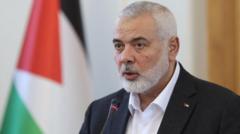In a significant escalation of rhetoric and military strategy, Israeli Defense Minister Israel Katz confirmed the assassination of Ismail Haniyeh, the politically influential leader of Hamas, who was reportedly killed in Tehran during July. This revelation, delivered in a speech on targeting leaders of the Houthi movement in Yemen, indicates Israel's reinforced military operations within the region. According to Katz, Israel aims to conduct similar strikes against Houthi leaders as it did with Haniyeh and other high-profile figures such as Yahya Sinwar of Hamas and Hassan Nasrallah of Hezbollah.
Haniyeh's assassination signifies a shift in Hamas leadership, with Yahya Sinwar taking the helm in the aftermath. Sinwar's role in orchestrating significant attacks, including those following the escalation of conflict after October 7, continues to highlight the volatility of the situation. While Prime Minister Benjamin Netanyahu acknowledged progress towards a ceasefire agreement between Hamas and Israel, key disagreements remain unresolved, complicating any potential resolutions.
The Houthis, backed by Iran, have increased military aggressions against Israel since the outbreak of the Gaza conflict in October last year. These actions have included missile strikes and attacks on international shipping in the Red Sea. Both the U.S. and Britain have also joined Israel in targeting Houthi military installations.
The ongoing military campaign initiated by Israel in response to the October attacks has resulted in significant casualties, with over 45,000 reported deaths in Gaza, according to sources from Hamas-controlled health ministries. Meanwhile, humanitarian organizations have raised alarm over the deteriorating conditions for civilians, emphasizing severe shortages of food and water exacerbated by military campaigns.
Reports from Oxfam highlighted the severe restrictions on humanitarian aid reaching civilians, further fueling criticism against Israeli military operations that they claim intentionally obstruct aid. In contrast, Israeli officials defended their humanitarian efforts, asserting their strategic military operations have aimed to ensure safety and mitigate threats from Hamas fighters.
Further complicating the situation, various human rights groups, including Amnesty International and Human Rights Watch, have accused Israel of committing genocide against Palestinian civilians. Israeli officials dismissed these accusations as groundless, insisting that their military campaigns are justified in protecting civilian lives amid ongoing security threats.
As the tension between Israel and its adversaries continues to escalate, the impacts of military strategies on the civilian population in Gaza remain a critical point of contention. The international community watches closely as both sides navigate this complex and often devastating conflict.
Haniyeh's assassination signifies a shift in Hamas leadership, with Yahya Sinwar taking the helm in the aftermath. Sinwar's role in orchestrating significant attacks, including those following the escalation of conflict after October 7, continues to highlight the volatility of the situation. While Prime Minister Benjamin Netanyahu acknowledged progress towards a ceasefire agreement between Hamas and Israel, key disagreements remain unresolved, complicating any potential resolutions.
The Houthis, backed by Iran, have increased military aggressions against Israel since the outbreak of the Gaza conflict in October last year. These actions have included missile strikes and attacks on international shipping in the Red Sea. Both the U.S. and Britain have also joined Israel in targeting Houthi military installations.
The ongoing military campaign initiated by Israel in response to the October attacks has resulted in significant casualties, with over 45,000 reported deaths in Gaza, according to sources from Hamas-controlled health ministries. Meanwhile, humanitarian organizations have raised alarm over the deteriorating conditions for civilians, emphasizing severe shortages of food and water exacerbated by military campaigns.
Reports from Oxfam highlighted the severe restrictions on humanitarian aid reaching civilians, further fueling criticism against Israeli military operations that they claim intentionally obstruct aid. In contrast, Israeli officials defended their humanitarian efforts, asserting their strategic military operations have aimed to ensure safety and mitigate threats from Hamas fighters.
Further complicating the situation, various human rights groups, including Amnesty International and Human Rights Watch, have accused Israel of committing genocide against Palestinian civilians. Israeli officials dismissed these accusations as groundless, insisting that their military campaigns are justified in protecting civilian lives amid ongoing security threats.
As the tension between Israel and its adversaries continues to escalate, the impacts of military strategies on the civilian population in Gaza remain a critical point of contention. The international community watches closely as both sides navigate this complex and often devastating conflict.















